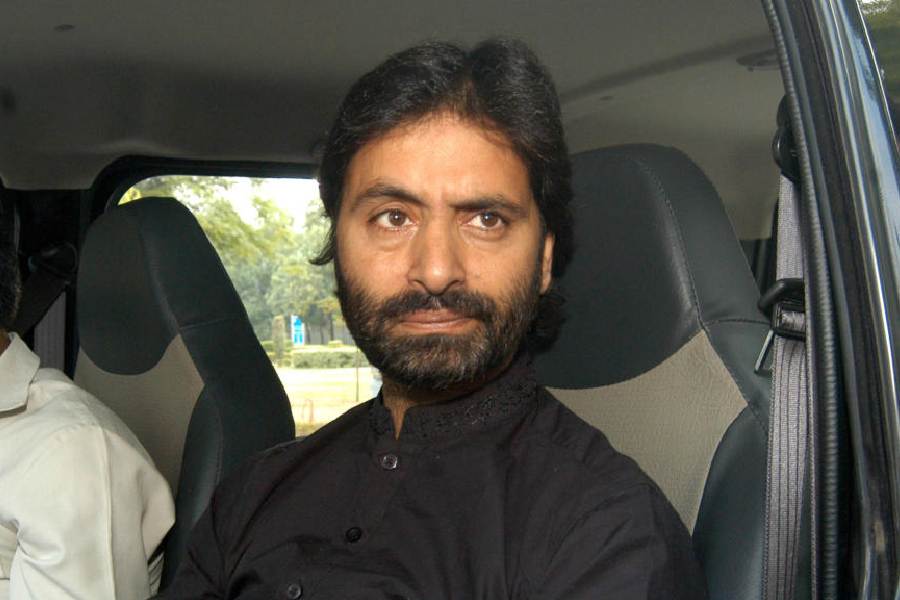The Supreme Court on Thursday mulled setting up a makeshift courtroom in the capital’s high-security Tihar jail for cross-examination of Kashmiri separatist leader Yasin Malik in the 1989 kidnapping case of Rubaiya Sayeed, daughter of then Union home minister Mufti Mohammad Sayeed, as the CBI opposed his physical production before a trial court in Srinagar.
Initially, the apex court expressed doubts as to how Malik could be cross-examined through video-conferencing (VC) from Kashmir because of connectivity-related issues. However, solicitor-general Tushar Mehta, appearing for the CBI, assured the court that necessary arrangements could be made.
“In this country fair trial was given to Ajmal Kasab.... A courtroom can be set up here in the jail and it (examination and cross-examination) can be done here. We also need to see how a judge can be posted in the jail only for this court,” Justice Abhay S. Oka, heading a two-judge bench, told the solicitor-general while posting the matter for further hearing to November 28.
The bench, which also had Justice George Masih, asked the CBI to inform the court by November 28 about details relating to the number of other accused persons and witnesses to be examined in the case so that appropriate orders could be passed.
The top court was dealing with an appeal filed by the CBI, challenging an order of a trial court in Jammu and Kashmir directing Malik’s physical production for his examination/cross-examination in the 1989 kidnapping case.
The CBI had challenged the directive on the ground that Malik’s physical production would seriously impinge on the security environment and that one of the witnesses had earlier been murdered.
Mehta stoutly opposed Malik’s physical production and placed in the apex court purported photographs to show the separatist’s frequent travel to Pakistan and interaction with Hafiz Sayeed, founder of the banned Lashkar-e-Toiba.
The solicitor-general also suggested that if Malik was not willing to appear through VC, the trial could be shifted to Delhi as the issue also involved the life and security of
various witnesses.
Further, the law officer complained that Malik was “not an ordinary criminal” and was deliberately “playing tricks” by insisting that he would appear personally without engaging a lawyer.
“The government cannot always go by the book in such cases,” he said.
Malik is serving a life term after being convicted by a special NIA court in May 2022 of waging war against
the country.
On July 21, 2023, another bench of the Supreme Court had expressed concern over the physical production of Malik that would require a high-security paraphernalia.
Malik was present in that hearing in connection with the appeal filed by the CBI challenging the order of a special NIA court in Jammu in September 2022.
One of the judges, Justice Dipankar Datta, recused himself from hearing the case that day, following which Justice Surya Kant, heading the bench, referred the matter to then Chief Justice of India D.Y. Chandrachud for setting up an appropriate bench that would not have Justice Datta as a member.
Malik did not speak throughout the hearing, although he wanted to argue his own case.
However, during the earlier brief hearing, Justice Surya Kant expressed surprise as to how Malik was present in the court. “Why does he want to appear in person? These days there is a virtual option. This is the best thing without compromising anything.”
Solicitor-general Mehta objected to the presence of Malik, saying that “there is a huge security risk and he is a high-risk individual who cannot be taken out of prison”.
Mehta had pointed out that the Union home ministry had earlier issued a notification under CrPC Section 268 which empowers the government to direct “that any person or class of persons shall not be removed from the prison in which he or they may be confined or detained”.
Despite the order being in force, Malik had been brought to the Supreme Court by the jail authorities by providing him high security, Mehta complained and said it would not be allowed to happen again.











